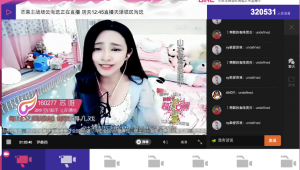Sina Weibo, iFeng, and ACFUN – these are the latest victims of China’s worry over live streaming.

Image via Wikipedia
Chinese officials have ordered three media outlets to shut down their live streaming for being out of line with national audiovisual regulations and “promoting negative comments” (in Chinese).
The streaming ban on Twitter-like social platform Weibo, news website iFeng and video-sharing and game streaming platform ACFUN was issued by State Administration of Press, Publication, Radio, Film, and Television of the People’s Republic of China (SAPPRFT). The reason for the ban remains unclear, especially since Weibo’s videos are actually hosted by a company called Yixia Technology which holds a video streaming license. Weibo also has a partnership with the National Football League to stream games.
However, according to one Weibo KOL, “[t]he new regulation does not ban all the videos on Weibo, only those shows without a license from the government. If you post anything from your life, it’s not banned.”
It does seem that this news, however damaging to the companies, is being sensationalized by some media outlets, according to Elijah Whaley, CMO at ParkLU.
“One: Weibo live streaming has not been ‘shut down.’ Two: Only some accounts, mainly those commentating on sensitive political and foreign news related topics, were closed,” he told TechNode. “It’s serious, in that there is definitely a government driven shake-up taking place on Chinese social media.”
However, that doesn’t mean that live streaming is out of the woods just yet. “We will likely see more accounts shut down, especially those that publish content which is classified morally subversive by the new Cyber Laws. Unfortunately, the new Cyber Laws are incredibly vague,” Elijah says. “We have heard whispers that English titles, foreign account holders, or content from outside China all could be banned, but it’s really all just rumors at the moment.”
This is not the first time the Chinese government cracked down on live streaming. The most notorious one was last year was in May when the country’s Ministry of Culture decided to ban provocative banana-eating during live streams. Their next target were foreigners: in February, hosts from outside mainland China were forbidden to live stream without permission from the Ministry of Culture.
In April this year, 18 illegal live streaming apps were shut down because anchors were “offending socialist core values” and bringing a ”negative impact on the healthy growth of the youth and teenagers.” An additional 10 were shut down in May citing obscene, violent and “feudal and superstitious” content among other reasons.
In another interesting twist, Chinese state media are jumping on the trend but with a more patriotic flavor. Shortly after the ban was announced state media outlet People’s Daily announced a new program on CCTV’s Finance Channel which encourages ordinary people to make their own films. However, the topics proposed are quite different than the usual live streaming content. The program aims to show off China’s achievements in recent years: For instance, a 4G telecommunications tower installed on a cliff, the Shanghai-Kunming high-speed rail that has shortened travel time between the two cities to 10 hours, and artificial intelligence. The selected videos will be promoted on TV programs and online video platforms.
Live streaming is big business in China, estimated to be worth RMB 20.8 billion, according to the latest report by internet market research firm iResearch. In 2016 it had an 180% growth from the previous year.
Most live streaming revenues come from the sale of virtual items and gifts, demonstrating and selling products, online games, and advertising. The most popular hosts can make up to US$ 20,000 USD per month. For some hosts, the business has been so good that they even decided to quit college, but now many of them are facing an uncertain future.
Although the main draw for live streaming is entertainment and connecting, it is no secret that many hosts spice up their performance to attract followers with salacious dancing and clothes. The statistics reflect this trend: although 80% of live streamers in China are female, they make up only 20% of the total user base.
“It served as a platform for an entire industry of virtual girlfriends,” said Aynne Kokas, an expert on Chinese media and assistant professor at the University of Virginia told the LA Times.
To please the government, live streaming companies have been introducing control mechanisms such as Douyu TV’s point system that punishes hosts for wearing skimpy clothes.
Video streaming stars, also known as wanghong, are not the only one taking a hit. According to Financial Times, thanks to the rise in live streaming advertising Sina Weibo had revenues of US$ 655.8 million in 2016, a 37 percent rise compared to the previous year. The platform, which has 300 million monthly active users, surpassed Twitter in market capitalization in February and was valuated at US$ 11.3 billion. After the ban, the company lost US$ 1 billion from its market capitalization while its stock plummeted 6.1 percent.
— This article originally appeared on TechNode.







